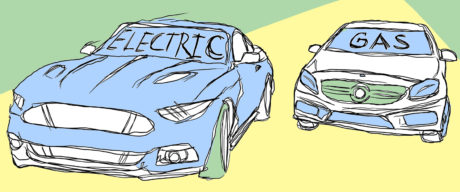Odds are good that when you hear the word “˜car,’ the image that pops into your mind today has an internal combustion motor that burns gasoline. This hasn’t always been the case, though.
In the early days of the automobile, there were multiple power sources vying for general usage. The Paris”“Rouen motoring competition in 1894 had 102 initial entrants. In addition to petrol, the engine styles included steam, hydraulic, compressed air and electric. Indeed, the “˜winner’ of the final race was a steam-powered vehicle, but it was declared ineligible because it needed a stoker. However, the next 13 finishers in order were all petrol, and teams that were declared the overall winners for being “˜closest to the ideal’ had petrol combustion engines. None of the four electric entries even showed up in the end.
Since that time, the gasoline combustion engine has been pretty much completely dominant in the world of mobile power. However, there are a number of signs that this might change in the not-too-distant future.
There have been a number of electric cars available for several years now. One could argue that hybrids, like the Toyota Prius, opened the door a bit as they combine gasoline engines with reasonably-sized electric batteries and electric engines to dramatically improve fuel efficiency. The modern electric car segment was really introduced with the Nissan Leaf in 2011. Of course, these days the segment is probably more identified with cars made by Tesla.
While these vehicles have been around for more than five years, the mass market appeal has been limited. The Leaf, which is priced for the mass market at around $30,000, suffers from a limited range of only a little over 100 miles on each charge, which restricts it to in-city commutes and buyers who can afford to have another option for longer distances. On the other end, the Tesla Models S and X are both capable of ranges of 300 miles on a charge, but realistic configurations tend to run closer to $100,000.
2017 marks the point where electric cars might finally be ready to break into the mass market. Tesla has grabbed the headlines in this space with the Model 3, with roughly a half million preorders placed before the first car was even built. The Model 3 sports a 220 mile range for $35,000 with an option for over 300 miles in the extended range version for $45,000.

The Model 3 isn’t alone though. The Chevy Volt gives owners over 230 miles for under $40,000, and while it didn’t get a half million preorders, the sales are steady and have been growing through the year.
You might be asking yourself, does this matter? Perhaps this is just something of interest for car enthusiasts, and that isn’t you. It isn’t me either. In fact, I hate driving, but this is part of a bigger picture. The obvious difference between electric cars and gas cars is whether you plug them in or put gas in the tank.
However, there is another huge difference. Electric cars have a lot fewer moving parts and much lower maintenance requirements. They should also last longer. The average internal combustion engine vehicle is good for about 250,000 miles. Estimates for the electric vehicles being built today are 600,000″“800,000 miles.
Does that really matter though? After all, it takes a long time to put 250,000 miles on a car since most of us leave our cars sitting around doing nothing well over 90 percent of the time. What is more, the new electric cars are more like moving computers. They have lots of technology, and we all know how well that ages. What good is a car that can last 20 years if you need to upgrade in two in order to run the current apps?
The answer to this question is the real key to the importance of electric cars, and it is something that excites someone like me who really doesn’t want to drive anyway. That will be the topic of my next column.






